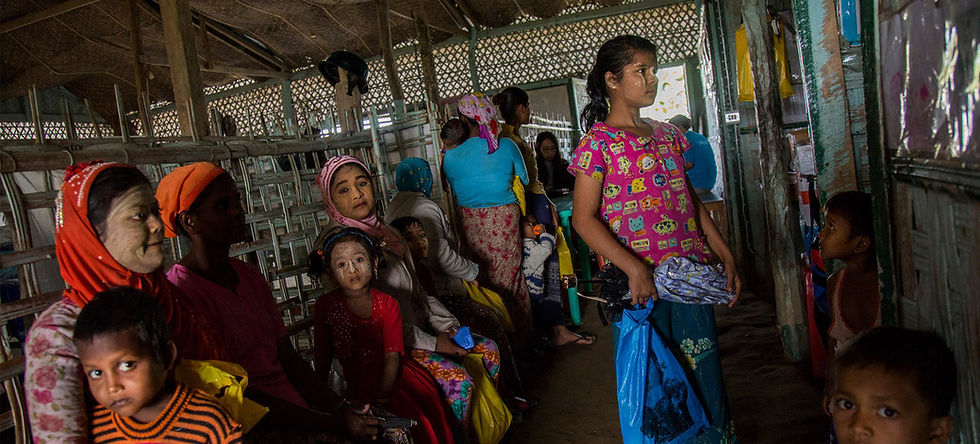The UN human rights office (OHCHR) voiced “serious concerns” on Tuesday over the situation in Myanmar – including rights violations and proliferation of hateful speech against minority communities – as the country prepares for general elections next month.

UNICEF/Nyan Zay Htet: Women and children from a local community at a health centre in Sittwe, in Myanmar's northern Rakhine state. (file photo)
Minority groups, including the Rohingya Muslim community and ethnic Rakhine population, have been disproportionately affected, said a senior OHCHR spokesperson in Geneva.
“While the elections represent an important milestone in Myanmar's democratic transition, the civic space is still marred by continuing restrictions of the freedoms of opinion, expression and access to information, and the use of language that could amount to incitement to discrimination, hostility and violence”, said Ravina Shamdasani at the regular media briefing in Geneva.
She also voiced concern over Government and military leadership’s intolerance towards opposing views or criticism of its policies and actions, in the run up to voting.
Over the past two months, dozens of student activists have been charged – and four of them sentenced to over six years’ imprisonment – under various laws after they called for an end to the conflicts in the northern Rakhine and Chin provinces and for reinstatement of mobile internet services in those areas, as well as for the release of other detained student activists.
“We urge the Government to drop charges against all those facing legal action for exercising their right to freedom of expression – a right that is particularly precious in a pre-electoral context,” said Ms. Shamdasani.
The elections are scheduled to be held on 8 November.
Muslim minorities ‘largely excluded’ from citizenship
Myanmar’s discriminatory citizenship and electoral laws confer different rights to different classes of citizens, most clearly affecting Muslim minorities who are largely excluded from any citizenship rights, according to the UN rights office.
There has also been significant disenfranchisement resulting from the Union Election Commission’s announcement on 16 October, that elections would not be taking place in 56 townships, including in Rakhine province.
“The Commission did not provide public justification for its decision – which curtails the right to political participation in areas with ethnic minority populations in a discriminatory fashion”, added Ms. Shamdasani.
Internet shutdown
She noted that an internet shutdown effectively remains in place in eight townships in Rakhine and Chin provinces, severely limiting the ability of residents to receive and deliver reliable information, including on COVID-19 and polling procedures.
“Blanket internet shutdowns may be counterproductive and contravene international law,” said Ms. Shamdasani.
‘Unrelenting proliferation of hateful speech’
The spokesperson also voiced deep concerns over “unrelenting proliferation” of hateful speech against Muslims on the Facebook social media platform. Facebook has made an effort to identify and remove such content, she added.
“We call on the Government of Myanmar to take action in line with the Presidential Directive 3/2020 of April this year to denounce such hateful language publicly and to promote tolerance, non-discrimination and pluralism in speech by public officials and electoral candidates”, said the OHCHR spokesperson.
COPYRIGHT © UNITED NATIONS
